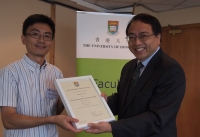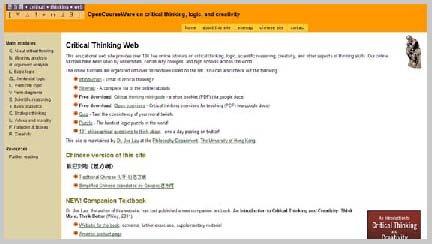Knowledge Exchange
Improving People’s Thinking Skills
Improving People’s Thinking Skills
The Critical Thinking Web is a remarkable resource that offers online tutorials and resources to anyone who wants to learn more about critical thinking and improve their skills in evaluating knowledge.
It’s a live example of the concept of free and open education, offering the fun and the serious: the world’s
hardest logic puzzle, a quiz to test the consistency of
your moral beliefs, self-learning modules on basic logic, scientific reasoning, strategic thinking, creativity and other concepts, a downloadable mini-guide on critical thinking, and many other materials.
Dr Joe Lau, Associate Professor in the Department of Philosophy, School of Humanities, launched the website in 2004 in collaboration with Dr Jonathan Chan of Baptist University of Hong Kong, and it now attracts up to
40,000 visitors per month from around the world.
Dr Lau says the website sprang from a desire to
teach students more about logic and critical thinking, use information technology in teaching, and make learning resources available to the general public.

Professor Lap-Chee Tsui presents the Faculty KE Award to Dr Joe Lau
“I believe free and online education will completely
change the way people teach and study, and this
will particularly benefit developing countries and disadvantaged minorities. I wanted to contribute
to this worthwhile cause and hence developed this
project,” he says.
Those goals have been readily met. Secondary schools, community colleges and universities in places as diverse as Mongolia, Uzbekistan, South Africa and
Australia are using the materials. The top 10 countries
using the site in 2010 spanned four continents and
included developed and developing economies: the
U.S., Hong Kong, the U.K., Canada, the Philippines,
Australia, Malaysia, China and Singapore.
Business and professional communities have also been clicking on the pages. “They want to learn more about critical thinking to enhance their reasoning skills,” says Dr Lau. “Some of them have borrowed the material in their in-house training courses. The Institute of Chartered Financial Analysts of India has published some of the material in an anthology on critical thinking.”
The quality of the site has earned praise from the
University Grants Committee and reviewers of HKU’s
Department of Philosophy, while Dr Lau says the
positive feedback from users has been the major factor in keeping the site going.
“I get emails from visitors saying they have found the
material useful. It is gratifying to know for example that the website is helping students in Vanderbijlpark in South Africa to improve their thinking skills. The fact that everything is on the web and free makes the difference,” he says.
The content on the website is updated by Dr Lau and the site is hosted by HKU. The website was one of the first in Hong Kong to make use of a Creative Commons license, which aims to balance copyright laws with the
open nature of the Internet and the aim of providing
universal access to knowledge.
The Critical Thinking Web can be visited at: http://philosophy.hku.hk/think/
Dr Joe Y F Lau received the Faculty Knowledge Exchange Award 2011 of the Faculty of Arts for the “Critical Thinking Web: Opencourseware on Critical Thinking, Logic and Creativity” project.


